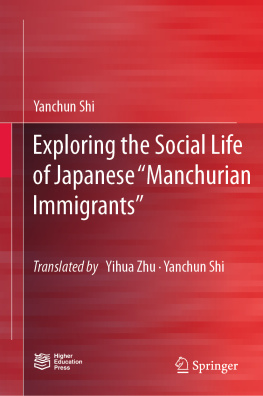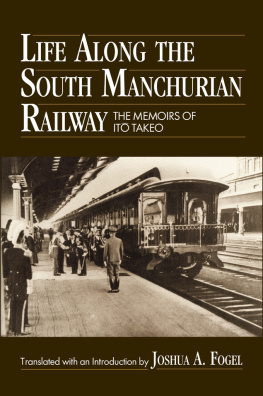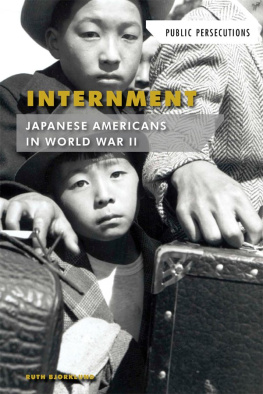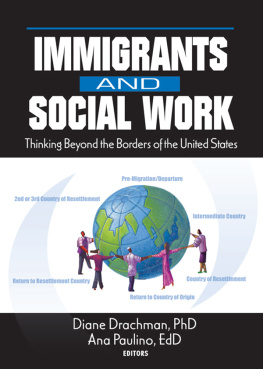Yanchun Shi - Exploring the Social Life of Japanese “Manchurian Immigrants”
Here you can read online Yanchun Shi - Exploring the Social Life of Japanese “Manchurian Immigrants” full text of the book (entire story) in english for free. Download pdf and epub, get meaning, cover and reviews about this ebook. year: 2020, publisher: Springer Singapore, genre: Politics. Description of the work, (preface) as well as reviews are available. Best literature library LitArk.com created for fans of good reading and offers a wide selection of genres:
Romance novel
Science fiction
Adventure
Detective
Science
History
Home and family
Prose
Art
Politics
Computer
Non-fiction
Religion
Business
Children
Humor
Choose a favorite category and find really read worthwhile books. Enjoy immersion in the world of imagination, feel the emotions of the characters or learn something new for yourself, make an fascinating discovery.
- Book:Exploring the Social Life of Japanese “Manchurian Immigrants”
- Author:
- Publisher:Springer Singapore
- Genre:
- Year:2020
- Rating:4 / 5
- Favourites:Add to favourites
- Your mark:
- 80
- 1
- 2
- 3
- 4
- 5
Exploring the Social Life of Japanese “Manchurian Immigrants”: summary, description and annotation
We offer to read an annotation, description, summary or preface (depends on what the author of the book "Exploring the Social Life of Japanese “Manchurian Immigrants”" wrote himself). If you haven't found the necessary information about the book — write in the comments, we will try to find it.
Yanchun Shi: author's other books
Who wrote Exploring the Social Life of Japanese “Manchurian Immigrants”? Find out the surname, the name of the author of the book and a list of all author's works by series.
Exploring the Social Life of Japanese “Manchurian Immigrants” — read online for free the complete book (whole text) full work
Below is the text of the book, divided by pages. System saving the place of the last page read, allows you to conveniently read the book "Exploring the Social Life of Japanese “Manchurian Immigrants”" online for free, without having to search again every time where you left off. Put a bookmark, and you can go to the page where you finished reading at any time.
Font size:
Interval:
Bookmark:
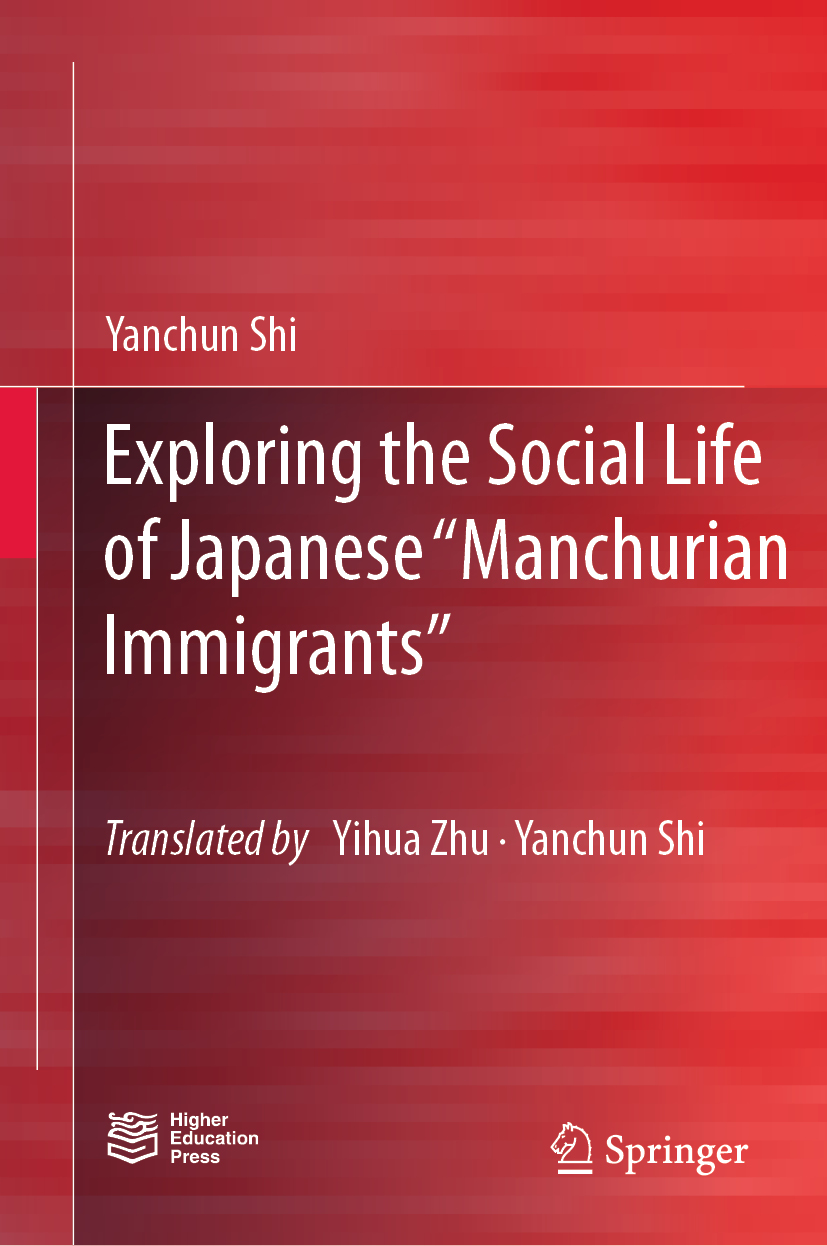


Jointly published with Higher Education Press
The print edition is not for sale in China. Customers from China please order the print book from: Higher Education Press.
This Springer imprint is published by the registered company Springer Nature Singapore Pte Ltd.
The registered company address is: 152 Beach Road, #21-01/04 Gateway East, Singapore 189721, Singapore
This study is included in the Academic Prominence Series in Humanities & Social Sciences of Jiangnan University and financially supported by the Fund for Academic Publication of Jiangnan University, for which I feel most indebted.
Colonization serves as an important means of aggression and expansion, which the colonial powers tend to use as a major form of colonial rule over and rapine from their colonies. Japan was no exception. After the Meiji Restoration (1860s1890s), Japan emerged as the first imperialist power in Asia with its increased strength in political, economic, social and cultural sectors, thus quickening its pace of breaking away from Asia for entry into Europe. As a maritime country with a strong motivation for global expansion, Japan had long been planning its population policy and military expansion policy. After the War of Jiawu, or the First Sino-Japanese War (July 25, 1894April 17, 1895), the Japanese Army and Navy planned the Northward Advance Policy aiming at capturing East Asia and the Southward Advance Policy aiming at seizing South Asia, respectively. After the Russo-Japanese War (19041905), Japan succeeded to all Russian rights in the southern half of Northeast China, which provided an opportunity for Japan to vigorously promote its aggressive policy of immigration into Northeast China. After the September 18th Incident in 1931, also known as the Mukden Incident in the West, Japan began to implement armed immigration under the planning and promotion of the Kwantung Army, resulting in approximately 10,000 households of immigrants into Northeast China after five rounds of immigration between 1932 and 1936. In 1937, the Japanese government launched the Million-Household Immigration Project, which was designated as one of the seven state policies of the Koki Hirota Cabinet and the three state policies of the puppet Manchukuo government, in a hope to solve its domestic political and economic crises. As the million households of immigrants would lay the foundation for Japans establishment of the Greater East Asia Co-Prosperity Sphere, the Million-Household Immigration Project was designed to help Japan effect its colonial rule over China with the Yamato People as the core, secure its permanent occupation of Northeast China and finally encroach upon the whole China. According to the survey conducted by the Ministry of Foreign Affairs of Japan, there had been about 1,550,000 Japanese immigrants within the puppet Manchukuo up till the defeat of Japan in 1945, including 2,50,000 living in Kwantung Leased Territory. Among them, about 270,000 were colonizers, or the so-called agricultural immigrants, accounting for 17%.
Migration entails the mobility of a group of population between different regions as well as the reshaping of socio-economic systems. Historically, with the advance of social productivity and human civilization, people migrated with increased population, accelerated speed and lengthened distance. Nowadays, issues concerning migration have become important topics for demographic researches.
As for the definition of migration or migrants, there are various interpretations at home and abroad, such as:
Cihai, or The Sea of Words, the most comprehensive Chinese thesaurus: Migrants are people who move to a permanent settlement in a foreign country while migration refers to organized relocation of a relatively large population.
Encyclopedia Americana: In a broad sense, human migration refers to the permanent movement of individuals or groups of people through considerable distances.
Encyclopedia of China Sociology: Migration means people leave their original place of residence and move beyond a certain administrative boundary to live in the destination. The population that has migrated is called migrants.
Yunwu Social Sciences DictionarySociology: Migration refers to geographical, spatial or regional population flow from the original place to a new one with change in residence. This kind of migration is permanent. The concept of migrants is only applicable to the population that settle down in a new place.
By summarizing these concepts, we can find that the Chinese termyiminhas two attributes. As a noun, it refers to a collection of migrants who move with their change of residence in geospatial location, while as a verb, it mainly refers to the moving of a population. If analyzed from migration sociology, the meaning ofyiminis two-faceted: a type of or group of people on the one hand and an action or social phenomenon on the other. The action or social phenomenon refers to trans-regional migration of a large population, thereby changing their place of settlement. For the former,yiminrefers to the person or a group of people involved in the above migration activities. Among others, the decisive factors that define migration are considerable distance, permanent settlement and resident population. According to these yardsticks, historical geographers like Ge Jianxiong et al defined immigrants in
Font size:
Interval:
Bookmark:
Similar books «Exploring the Social Life of Japanese “Manchurian Immigrants”»
Look at similar books to Exploring the Social Life of Japanese “Manchurian Immigrants”. We have selected literature similar in name and meaning in the hope of providing readers with more options to find new, interesting, not yet read works.
Discussion, reviews of the book Exploring the Social Life of Japanese “Manchurian Immigrants” and just readers' own opinions. Leave your comments, write what you think about the work, its meaning or the main characters. Specify what exactly you liked and what you didn't like, and why you think so.

